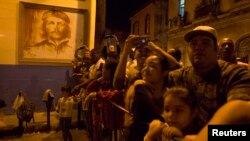The recent U.S. decision to restore diplomatic ties between the United States and Cuba after more than 50 years has interested parties debating whether it will lead to an enhancement or regression of democracy on the Communist island nation.
A mix of politicians and analysts in the U.S., some South Florida exiles and key members of Cuba’s dissident community have all pointed to China and Southeast Asia as an area where democracy has retracted in the face of détente with America.
“We’ve seen what happens in these transitions, [looking at] China, Vietnam and Burma, these are corrupt Communist dictatorships that are highly repressive. In fact they’ve gone backwards,” Mike Gonzalez of the Heritage Foundation told VOA's Encounter.
“China initiated a reform process 30 years ago,” he said. “It has perfected the model for economic opening while keeping the Communist party in power.”
That skepticism is shared by Republican Party leaders and a number of lawmakers of Cuban descent, including Senator Marco Rubio, who earlier this month downplayed the idea that increased trade would lead to political openness in Cuba.
But those who support the diplomatic embrace reject this argument.
“Cuba rests in a very different part of the world than China or Vietnam. We’re in a democratic hemisphere, and Cuba is next door to one of the largest, most successful, powerful democracies in the world – the United States,” said the Brookings Institution’s Ted Piccone.
“This policy change will allow other regional neighbors to join us in supporting democratic change in Cuba,” he said. “That’s the hemispheric standard.”
A national Pew Research poll, conducted January 7-11, showed that while 63 percent of Americans approved of U.S. President Barack Obama’s decision last month to re-establish ties, only about one-third thought a thaw in relations would lead to greater democracy in Cuba.
In fact, detractors worry that while the U.S. is prepared to compromise in the name of diplomacy, the Cuban government is cynically seeking a new benefactor it will not hesitate to eventually discard.
“The Castros want U.S. money to maintain power. I believe the minute [traditional allies] Russia and Venezuela can help Cuba again, they will turn their backs on the United States,” said Jorge Lima of the Libre Initiative, a conservative group based in Washington.
“President Obama has said many things regarding new relations with Cuba, and many changes have been made, [but] the Castros have made no changes, the people still have no liberty,” Lima told VOA's Foro Interamericano.
Still, given the reality of U.S. politics, some developments will come faster than others, experts say.
A bipartisan group of U.S. senators introduced a bill Thursday to permanently lift all restrictions on American travel to Cuba. But ending Washington’s 54-year-old trade embargo against Cuba is not likely to happen in a Republican-controlled U.S. Congress.
“It will be a gradual process,” said Carl Meacham of the Center for Strategic and International Studies. “Isolation is exactly what dictators want. In the long run, this change will create a desire among the Cuban people for commerce, technology and liberty.”
In fact, the embargo not only isolated the U.S. from the Cuban people, but from other Latin American neighbors as well, according to Piccone.
“What we’ve tried over the last 50 years is very punitive [and] the Castro regime has it used against us. The whole world has condemned this embargo,” he said.
But the few dissidents in Cuba brave enough to speak out are unified in saying they feel betrayed by Obama, according to Gonzalez.
“It’s not just Cuban-Americans and members of Congress who are against this quite shameful decision,” he said.





